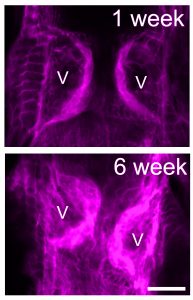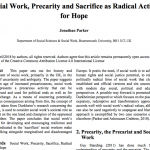 Research funded by the British Heart Foundation looking at tissue fibrosis (scarring), will soon be published in Experimental Gerontology, one the world’s leading journal on ageing. Fibrosis occurs naturally as part of our injury response process but also develops in ageing and chronic disease. Treatments are scant despite fibrosis leading to organ failure and increased risk of death.
Research funded by the British Heart Foundation looking at tissue fibrosis (scarring), will soon be published in Experimental Gerontology, one the world’s leading journal on ageing. Fibrosis occurs naturally as part of our injury response process but also develops in ageing and chronic disease. Treatments are scant despite fibrosis leading to organ failure and increased risk of death.
The image shows valves (v) in the hearts of young and ‘late middle aged’ fruit flies that have been genetically engineered to express fluorescent collagen, an key ‘scar protein’. Although the fly heart is just two cells wide it represents a lot of the genetic machinery for a human heart. Amazingly, the function of human and fly hearts declines as they age – and they both accumulate collagen.
Our previous work linked heart function with SPARC – a protein associated with fibrosis in humans. We’ve now demonstrated that the heart’s ‘health-span’ during ageing can be significantly lengthened if the expression SPARC is reduced. We also show that if SPARC levels increase – fibrosis is increased too. Hence, we’ve nailed a cause-and-effect relationship between SPARC and heart function which supports the idea of targeting SPARC clinically to control cardiac health and fibrosis.
Paul S. Hartley (Department of Life and Environmental Science).
 Social Work, Precarity & Sacrifice as Radical Action for Hope
Social Work, Precarity & Sacrifice as Radical Action for Hope










 BU attendance at third annual GCPHR meeting in June
BU attendance at third annual GCPHR meeting in June Interactive Tangible and Intangible Heritage Applications – BU student work featured in new book chapter
Interactive Tangible and Intangible Heritage Applications – BU student work featured in new book chapter Second NIHR MIHERC meeting in Bournemouth this week
Second NIHR MIHERC meeting in Bournemouth this week MSCA Postdoctoral Fellowships 2025 Call
MSCA Postdoctoral Fellowships 2025 Call ERC Advanced Grant 2025 Webinar
ERC Advanced Grant 2025 Webinar Horizon Europe Work Programme 2025 Published
Horizon Europe Work Programme 2025 Published Horizon Europe 2025 Work Programme pre-Published
Horizon Europe 2025 Work Programme pre-Published Update on UKRO services
Update on UKRO services European research project exploring use of ‘virtual twins’ to better manage metabolic associated fatty liver disease
European research project exploring use of ‘virtual twins’ to better manage metabolic associated fatty liver disease